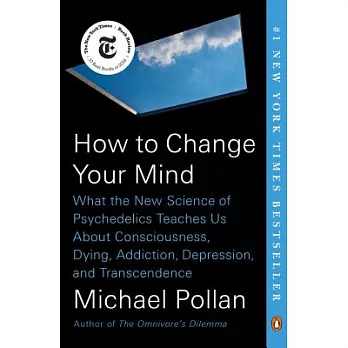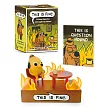《紐約時報》丶《洛杉磯時報》丶《出版人週刊》年度好書《雜食者的兩難》作者麥可波羅全新力作!這是一本科學書籍,也是精彩遊記丶私密傳記,還是一本帶領我們探索人類自我、意識、感官可能性的紀實報導。
吃了迷幻藥,你在想什麼?
當我們總是沮喪丶總是焦慮,該如何突破這樣的情緒困境?有些人選擇旅行丶美食或者尋求醫療協助,而有些人則投向迷幻藥和裸蓋菇素(迷幻蘑菇)的懷抱。
隨著迷幻藥研究的進行,麥可波羅發現,不僅身陷心理疾病的病患會視迷幻藥為慰藉,身心健康的人面對日常生活會碰到的難題時也會倚靠迷幻藥。於是,麥可波羅試圖以當事者及旁觀者的角度來探索人們為何使用迷幻藥,而迷幻藥又帶來了什麼影響。1960 年代起,推崇迷幻藥的神話多如繁星,留下來的資料與正規研究混雜不清,麥可亦將其分類,讓我們對迷幻藥有更正確的認識。
麥可波羅深入研究最新的大腦科學,與日益繁盛的迷幻成份治療師,並親自以身體驗,探訪人類意識的各種階段與可能。化作這本兼具前沿科學發展報導,與個人的「心智旅遊誌」,為人們對於意識、心智、大腦體驗的多樣豐富,長久以來的好奇嚮往,提供一探究竟的機會,在其中領略生存於世的意義。(文 / 博客來編譯)
Now on Netflix as a 4-part documentary series!
"Pollan keeps you turning the pages . . . cleareyed and assured." --New York TimesA #1 New York Times Bestseller, New York Times Book Review 10 Best Books of 2018, and New York Times Notable Book A brilliant and brave investigation into the medical and scientific revolution taking place around psychedelic drugs--and the spellbinding story of his own life-changing psychedelic experiences When Michael Pollan set out to research how LSD and psilocybin (the active ingredient in magic mushrooms) are being used to provide relief to people suffering from difficult-to-treat conditions such as depression, addiction and anxiety, he did not intend to write what is undoubtedly his most personal book. But upon discovering how these remarkable substances are improving the lives not only of the mentally ill but also of healthy people coming to grips with the challenges of everyday life, he decided to explore the landscape of the mind in the first person as well as the third. Thus began a singular adventure into various altered states of consciousness, along with a dive deep into both the latest brain science and the thriving underground community of psychedelic therapists. Pollan sifts the historical record to separate the truth about these mysterious drugs from the myths that have surrounded them since the 1960s, when a handful of psychedelic evangelists inadvertently catalyzed a powerful backlash against what was then a promising field of research. A unique and elegant blend of science, memoir, travel writing, history, and medicine, How to Change Your Mind is a triumph of participatory journalism. By turns dazzling and edifying, it is the gripping account of a journey to an exciting and unexpected new frontier in our understanding of the mind, the self, and our place in the world. The true subject of Pollan’s "mental travelogue" is not just psychedelic drugs but also the eternal puzzle of human consciousness and how, in a world that offers us both suffering and joy, we can do our best to be fully present and find meaning in our lives.


 天天爆殺
天天爆殺  今日66折
今日66折 
























 博客來
博客來 博客來
博客來 博客來
博客來 博客來
博客來 博客來
博客來